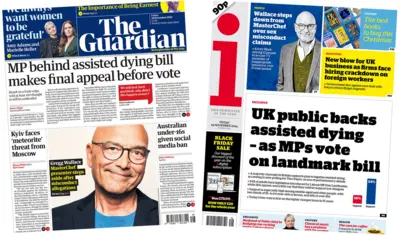We've updated our Privacy and Cookies Policy
We've made some important changes to our Privacy and Cookies Policy and we want you to know what this means for you and your data.
Katharine Birbalsingh: New social mobility chief challenges assumptions
- Author, Nick Robinson
- Role, Presenter, Political Thinking podcast
Articulate, passionate and showing not a trace of doubt, she reminded me of Margaret Thatcher in her pomp.
Yet Katharine Birbalsingh, the new chair of the , couldn't be more different - at least in terms of her background and the views she advocated when Thatcher was still a dominating presence in politics.
Ms Birbalsingh is the child of a Jamaican nurse and a left-wing Guyanese academic. At university she joined the Socialist Workers Party and read Living Marxism.
What changed her into the woman who is now the darling of the right was her experience in state schools, and the stark contrast she saw with the educational opportunities of those she'd mixed with at Oxford University.
A teacher in inner city state schools for the past two decades, she came to believe that the education system is "broken" because it has a "culture of excuses and low standards", and permits chaos in the classroom.
It was those views expressed in a speech at the Tory Party Conference a decade ago which, she claims, led her to lose her job and to be "cancelled".
Her reaction was set up her own "free school" in Wembley with the help and support of Michael Gove.
The way she runs that school has led her to be labelled Britain's strictest head.
Children queue in silence in the corridors or are given detention. They sit behind desks in rows and listen to a teacher talking from the front of the classroom. Pupils whose parents don't pay for the lunches, but who can afford to, are forced to eat on their own.
Friends and foes alike recognise that the school achieves extraordinary academic results.
It is, though, Birbalsingh's views on race that have made her so controversial.
'Change their stars'
She condemns a culture of excuses and an atmosphere of fear which, she argues, makes teachers reluctant to discipline black boys.
She told me: "For us to insist that all we should be doing is talking about racism - it undermines the sense of self-worth that children can have in themselves, that they desperately need to be able to change their stars and make something better of themselves."
When I invite her to accept that what works at an individual or school level may not be helpful when developing policies for society as a whole, she is having none of it.
"Individuals make up society," she insists, echoing one of Mrs Thatcher's most famous quotes.
"Each of those individuals needs to take on board the right set of values so that they can make something of their lives. I don't understand what's wrong with that."
When I suggest that she risks alienating people, and needs to win allies and build consensus, she looks baffled.
What's clear is that, unlike her predecessors, she will not be criticising ministers for cuts in support for school budgets or lunches. She won't be condemning institutional racism.
She plans instead to use her new national platform to make the case for "small c" conservative values - family, discipline, order - which she insists have turned round lives in the inner city schools she now runs.
Katharine Birbalsingh is not a politician. She insists she is not a Conservative either.
However, she may have more influence on our political thinking than many who are both.
Top Stories
More to explore
Most read
Content is not available








